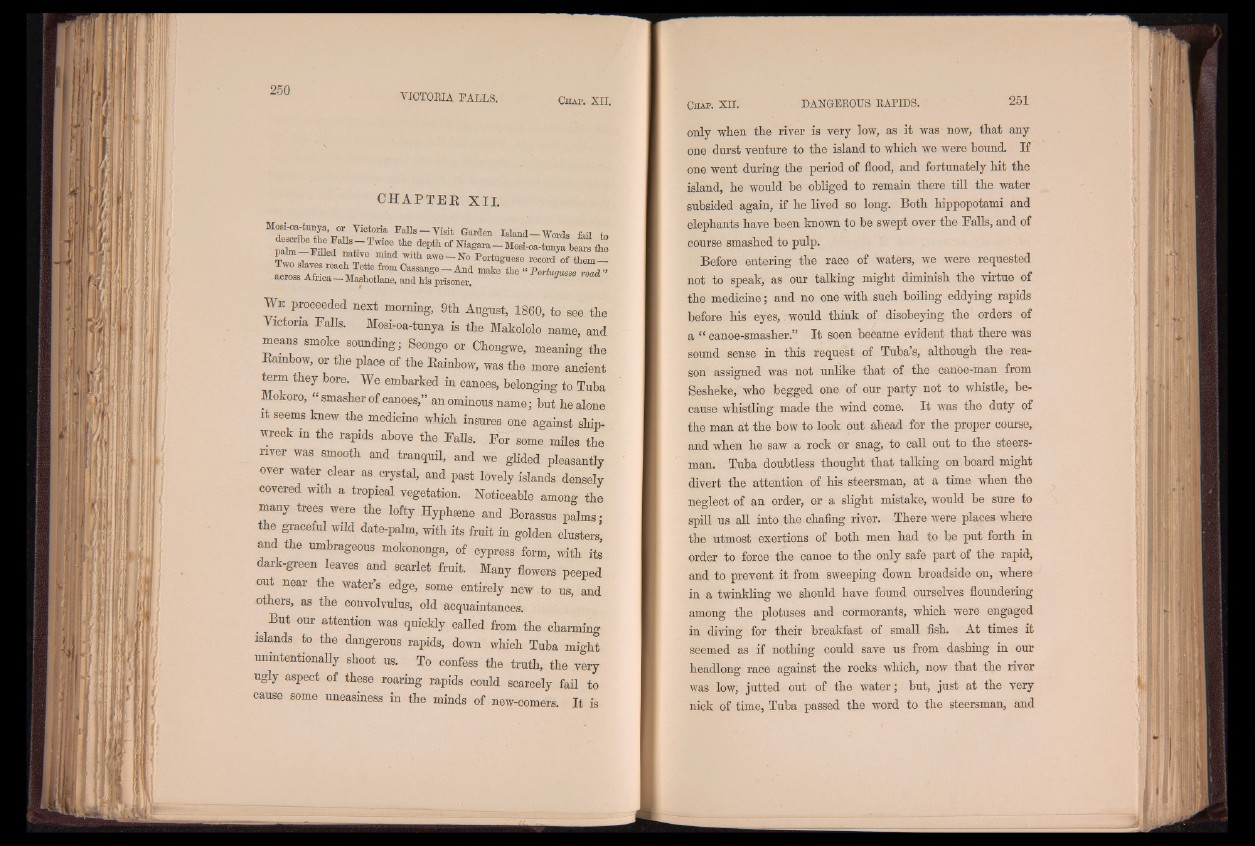
C H A P T E R X I I .
Mosi-oa-tenya or Victoria F a lls -V is it Garden Island-Words foil to
palm Fdled native nnnd mth aw e -N o Portuguese record of th em -
Two slaves reach Tette from Cassange — And make the “ Portuguese road ”
across Africa—Mashotlane, and his prisoner.
We proceeded next morning, 9th August, 1860, to see the
Victoria Falls. Mosi-oa-tunya is the Makololo name, and
means smoke sounding; Seongo or Chongwe, meaning the
Rainbow, or the place of the Rainbow, was the more ancient
term they bore. We embarked in canoes, belonging to Tuba
Mokoro, “ smasher of canoes,” an ominous name; but he alone
it seems knew the medicine which insures one against ship-
wreck m the rapids above the M s . For some miles the
nver was smooth and tranquil, and we glided pleasantly
over water clear as crystal, and past lovely islands densely
covered with a tropical vegetation. Noticeable among the
many trees were the lofty Hyphame and Borassus palms-
the graceful wild date-palm, with its fruit in golden clusters'
and the umbrageous mokononga, of cypress form, with its
dark-green leaves and scarlet fruit. Many flowers peeped
out near the water’s edge, some entirely new to us, and
others, as the convolvulus, old acquaintances.
. Eut our attention was quickly called from the charming
islands to the dangerous rapids, down which Tuba might
unintentionally shoot us. To confess the truth, the very
ugly aspect of these roaring rapids could scarcely fail to
cause some uneasiness in the minds of new-comers. I t is
only when the river is very low, as it was now, that any
one durst venture to the island to which we were bound. If
one went during the period of flood, and fortunately hit the
island, he would be obliged to remain there till the water
subsided again, if he lived so long. Both hippopotami and
elephants have been known to be swept over the Falls, and of
course smashed to pulp.
Before entering the race of waters, we were requested
not to speak, as our talking might diminish the virtue of
the medicine; and no one with such boiling eddying rapids
before his eyes,: would think of disobeying the orders of
a “ canoe-smasher.” I t soon became evident that there was
sound sense in this request of Tuba’s, although the reason
assigned was not unlike that of the canoe-man from
Sesheke, who begged one of our party not to whistle, because
whistling made the wind come. I t was the duty of
the man at the bow to look out ahead for the proper course,
and when he saw a rock or snag, to call out to the steersman.
Tuba doubtless thought that talking on board might
divert the attention of his steersman, at a time when the
neglect of an order, or a slight mistake, would be sure to
spill us all into the chafing river. There were places where
the utmost exertions of both men had to be put forth in
order to force the canoe to the only safe part of the rapid,
and to prevent it from sweeping down broadside on, where
in a twinkling we should have found ourselves floundering
among the plotuses and cormorants, which were engaged
in diving for their breakfast of small fish. At times it
seemed as if nothing could save us from dashing in our
headlong race against the rocks which, now that the river
was low, jutted out of the water; but, just at the very
nick of time, Tuba passed the word to the steersman, and